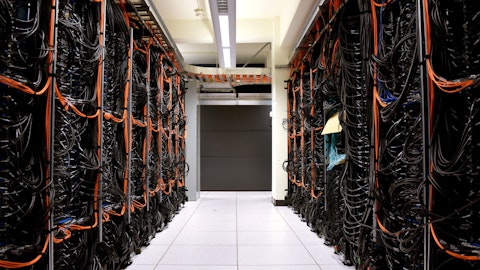Neil Hunn: Yes. I think there’s definitely and demonstrably benefits for getting our leaders together unequivocally. It’s going to be more in sharing best practices, sharing leadership philosophy, sharing failures and what they learn from the failure. It’s going to be more about how do you lead, how do you manage, how do you inspire teams for terrific performance it’s going to be less on connection with the product teams, because most of our businesses are in independent and disconnected markets and swim lanes. So if there’s something that makes sense, we’ll certainly do it. If it doesn’t make sense, we won’t. The good news about this particular iPipeline and Vertafore is it happened organically between the businesses without any push from the center. So you know that’s authentic and it’s going to drive value for our customers.
Joe Vruwink: Okay. That’s helpful. Just on the topic of generative AI. As you say, your businesses, they provide the context that the applications need, so growth retention if anything, is biased higher in many aspects. How do you think about net retention and just participating in new avenues for growth. So with some of the early products discussed today, does that really strengthen the core? Or is there a separate monetization that can happen?
Neil Hunn: No, no. I think there’s definitely monetization that could happen. It will happen over time. There’s no silver bullet in the short run. We play the long game, build for long-term customer value of relationships. But there’s just massive amounts of value that can be created by doing things with both computation on generative AI. And our relationship with our customers are such that we’re, at least for the last 20-years, we’re able to capture our fair share of the value that’s created. So I don’t know why that would be any different going forward. And then as we all know, there’s a tremendous amount of value or productivity to capture inside the four walls of our businesses using Generative AI as well.
Joe Vruwink: Great. Thank you very much.
Neil Hunn: Thank you.
Jason Conley: Thanks, Joe.
Operator: Thank you. And the next question comes from Allison Poliniak with Wells Fargo.
Allison Poliniak: Hi, good morning. I saw the announcement with IntelliTrans sort of stepping out and partnering with the product sensor business. Is that something that’s just unique to IntelliTrans? Or is it something that you’re doing to sort of leverage that sort of asset-light business that you have? Any thoughts there?
Neil Hunn: No, that’s very, very bespoke to IntelliTrans. I mean there’s not an enterprise-wide strategy to do anything like that nor would we — if there was, we wouldn’t push it down. It’s anathetical to what Roper is about. So it’s very bespoke to IntelliTrans. Gold star for asking IntelliTrans question, by the way.
Allison Poliniak: It helps also covering transports. So — and then just on tech-enabled products, that business continues to outperform organically. You mentioned difficult comps in Q3. Is there any more color you can give us to the cadence between Q3 and Q4 to, kind of, reach that target? And what sort of drove that outperformance this quarter? Thanks.
Jason Conley: Yes. So this is Jason. I think it’s a pretty consistent cadence in terms of the quarters. What I would say is the outperformance in Q3 was really across the board. We had — Neptune continues to execute really well in their backlog. Their daily sales are up over their plan. Health care is doing really well in terms of procedures. So just executing on a kind of book-and-ship basis there. And then our — some of our [Technical Difficulty] product businesses had some backlog that finally got cleared. So that really drove the Q3. And then the second-half, like I said, organic growth should be fairly consistent. It’s just what we had last year. We had a lot of backlog clear in the third quarter that with very high-margin products. So that’s sort of the comp issue that we’re lapping in the third quarter.




